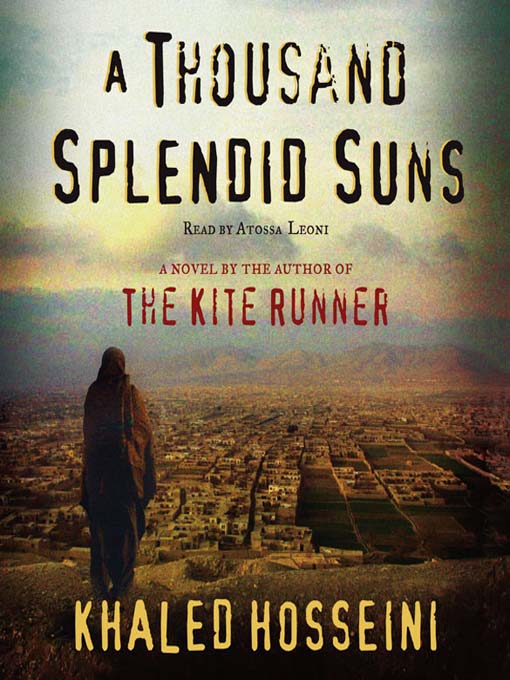 You might remember the last time I wrote about a Khaled Hosseini novel. The Kite Runner was one of the first books I read this year, and it just destroyed me, in the best possible way. So you can’t blame me for my reluctance to pick up another of Hosseini’s books. I knew it would be an amazing work of fiction, but I wasn’t sure I could handle the emotional turmoil. After my traumatic experiences with The Kite Runner I needed a good long break before diving into another devastating novel. But when two of my dearest friends gave me A Thousand Splendid Suns for my birthday, I knew I could wait no longer.
You might remember the last time I wrote about a Khaled Hosseini novel. The Kite Runner was one of the first books I read this year, and it just destroyed me, in the best possible way. So you can’t blame me for my reluctance to pick up another of Hosseini’s books. I knew it would be an amazing work of fiction, but I wasn’t sure I could handle the emotional turmoil. After my traumatic experiences with The Kite Runner I needed a good long break before diving into another devastating novel. But when two of my dearest friends gave me A Thousand Splendid Suns for my birthday, I knew I could wait no longer.
So here I am, several months later, finally ready to talk about this beautiful, despicable, torturous story. I fully believe that everything Hosseini’s pen touches is destined to evoke tears in anyone with a heart. In fact, I think it’d be safe to use his work as a basic test of humanity, should aliens ever infiltrate our species. Anyone who isn’t visibly scarred by a Khaled Hosseini novel is obviously inhuman, and should be called out at once.
Anyway, back to the point, when I began reading A Thousand Splendid Suns I don’t know what I expected. Well, maybe that’s not true – I expected another Kite Runner novel, one that would immediately start tearing me to shreds within the first three chapters. In that regard, at least, I got what I expected, but my expectations didn’t shield me from it. But this novel was a very different sort of novel from Hosseini’s first. Where The Kite Runner was a blazing fire, A Thousand Splendid Suns was a slow burning ember – capable of causing destruction, but much easier to miss.
For one thing, the story here centers on two women in Afghanistan, and the majority of the plot takes place within the confines of a small household. Where the horrors of The Kite Runner centered on outside brutality, the horrors here are just a side-effect of the inequality of marriages within Afghanistan. It was more horrific to me, seeing the things that could happen to a woman, in a world where no one cares what your husband might do to you because you are his property from the moment you sign your marriage contract.
“The only enemy an Afghan cannot defeat is himself.”
The power of those words made me shudder as each chapter brought new terrors. Perhaps the worst thing, however, was the acceptance Laila and Mariam have towards their lot in life. The story doesn’t draw out the agonies they suffer. Rather, it simply remarks upon them, listing each offense like it’s commonplace. And then it dawns on you in one fell swoop – for many women in Afghanistan, and in other parts of the world, those things you and I see as barbaric and cruel are everyday life.
I’m going to tell it to you straight. This book broke my heart. It broke my heart because I live in a place where I am lucky to never have to deal with this situation – I stand no risk of being treated like a slave, abused, and raped by my husband. But there are so many women in this world who do. The dread of this book lies in the simple fact that it’s so damn believable. Hosseini’s characters live and breathe like real people who have lived and loved and lost. In part, that’s due to his mastery of Afghanistan’s rich history, and his ability to accurately portray the Afghanistan that was lost the day the Taliban took power. We don’t spend enough time remembering that life in Afghanistan was not always as it is now, or mourning the great loss her people have suffered over the past fifty years.
“Here was a woman, she thought, who had understood that she was lucky to even be working, that there was always something, something else, that they could take away.”
That’s some raw perspective, isn’t it?
A Thousand Splendid Suns is a slow, almost unassuming story, but at its heart it’s about the ties that bind us together, it’s a celebration of womanhood and motherhood, a condemnation of any system in the world that belittles women or children or any other minority, and just a beautiful, gut-wrenching, heart-warming, book.
Go read it. You might learn something; I sure as heck did.
Rating: 5/5 stars
Overall Reaction: “Oh my goodness, this is horrible. Nothing can be worse than this.” Several pages later… “Oh my goodness, this is horrible. This is the worst thing. It really can’t get any worse.” Several more pages… “Oh.”